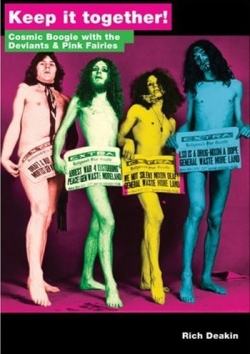Ever get the feeling
that somebody's watching you? Well, you've good reason to! Mick Farren's latest
book, co-written with John Gibb, ventures deep into the world of high-tech
surveillance and intelligence, from which it would seem no area of our
lives are untouched by intrusion.
Ranging from gambling casinos, which the authors liken to "the full
surveillance police state in which, everyone and everything is
constantly watched" in microcosm; through RFID cards that are used
increasingly on public transport systems, in the workplace, and
supermarket goods; the ever pervasive CCTV cameras that dog our every
footstep, in most built-up urban areas at least; and to the internet
at home or work.
All these methods are used to track our every movement, our exact
location, what shops we go to, what websites we visit, or what we
purchase or subscribe to online -- even the seemingly benign, loyalty
"store card" builds up a profile of you on the assumption of what's on
your supermarket till receipt, right down to our preference in food
and booze.
But however
innocuous the idea of loyalty cards may seem, think again -- these are
only the tip of the iceberg. Scratch beneath the surface and you'll
find a beast known as Echelon
-- the United States's National
Security Agency's monitoring system, with its HQ based at Menwith Hill,
England.Aided
and abetted by human attendants, Echelon
can monitor every phone call, fax, email, and telex message sent anywhere
in the world. Using a computer complex that includes "advanced voice
recognition and optical character recognition programs, key words that
match those already programmed in the high risk 'dictionary' … prompt the
computer to flag any message for recording and transcribing for future
analysis." Farren also says, "In a world that survives on communications,
this system is a close to god-like entity that sees all, hears all, and
within its set objectives, essentially knows all."
Frightening
stuff, really. But if that's too mind-boggling for you to comprehend,
how about the more tangible, closer to home, examples of MySpace.and
Google?
In addition
to providing the potential for identity theft, Farren and Gibb highlight
MySpace's
perceived shortcomings by explaining how the system provides a back door
for all manner of Trojan horse viruses, spyware, and adware. Plus,
in a climate where concern over online predators is high, parents may resort
to snooping devices, and other MySpace
tracking software, to spy on their offspring, just as anyone else can use
such methods to see who's visiting their page. When this technology
is extended to spy on the perceived wrongs of a spouse, lover, or offspring,
the authors argue that this, "leads to establishing a generally unhealthy
atmosphere of unwarranted cyber-snooping and domestic paranoia."
On a more
amusing note, one can't help but chuckle when the authors relate how some
employers have had the foresight to check prospective employees' backgrounds
via MySpace -- "young
college graduates ruefully complain that they have been turned down for
jobs because they had unthinkingly posted accounts of their raunchy Animal
House-like antics, and even details of their sexual conquests, which
were easily revealed by a MySpace
search."
For all
its pitfalls, some of MySpace's
shortcomings could easily be avoided by omitting to include any information
likely
to cause embarrassment at a later date, and by updating firewalls and anti-virus
protection on a regular basis.
As for
Google, it's unlikely that any amount of preventive measures are likely
to stop its inexorable quest in not just providing, but also collecting,
information on just about everything -- including our personal details
and every movement we make on the web. The chapter "When Google Will
Know Everything" is thought- provoking enough to make one reappraise Google's
motives in the wider scheme of things, and it has to be read to comprehend
all of the implications of Google's ever expanding operations.
These
are a few examples from twenty chapters that Farren and Gibb use to highlight
the nature of modern surveillance and how it may be used against us.
You might ask if this is the work of a couple of scare-mongering conspiracy
theorists, providing more fuel for paranoiacs. I don't think it is. Once you've read the
book, you'll see that Farren and Gibb cogently argue their case, and
answer
that old dicta: "If you're not doing anything wrong, what do you have
to hide?"
Privacy
is a fundamental human right, and should be defended even if we aren't
trying to hide something. Why should "they" need to know everything
about you? Maybe it's because they can -- and that's what makes it
all the more worrying.
| In
1999 Rich Deakin completed an MA thesis, "The British Underground Press,
1965-1974."
He's
the author of Keep
It Together! Cosmic Boogie with the Deviants and Pink Fairies, a biography
of two legendary countercultural English rock bands renowned for their
anti- establishment stance and libertarian tendencies in the late 1960s
and early 1970s.
Deakin
may be contacted though his website: Funtopia. |
 |

